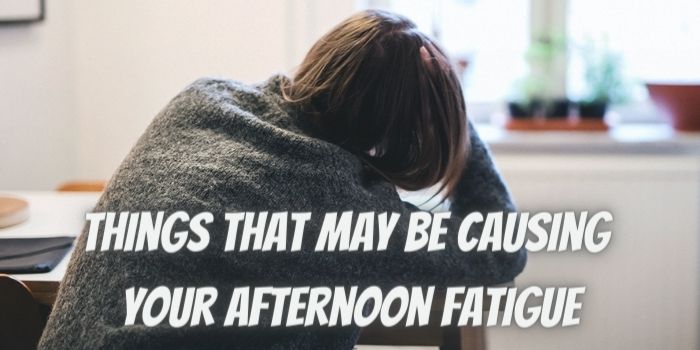The afternoon slump. The incessant yawning after your lunch break. The 2 p.m. coffee break you just can’t quit. These hallmark signs of afternoon fatigue are hard to ignore, but they may be spurred by unexpected factors.
If you’re yawning regularly in the afternoons, it may be a sign that something is askew. Late-night binge watching aside, there may be more at play to explain why you’re so tired. Consider your habits and personal experience to expose the culprit and quash your tiredness for good.
1. You’re Not Getting Restful Sleep
Your circadian rhythm dictates how much sleep is optimal for your unique needs. This makes the standard recommendation of eight hours of sleep somewhat negotiable. However, what isn’t negotiable is high-quality sleep.
Generally, sleep cycles last 90 minutes, so if your sleep cycles are interrupted throughout the night, you won’t be well rested. If you wake up feeling almost as tired as before, it may be a sign that your sleep isn’t restorative.
Some people experience sleep apnea — a condition in which sufferers repeatedly stop breathing during sleep — for years without realizing it. Loud snoring and dry mouth upon waking could be indicators that you should discuss the issue with your physician.
They may prescribe a CPAP (continuous positive airway pressure) machine to help you breathe better while sleeping. Your provider can work with you to determine a treatment plan and identify the best CPAP mask for you.
2. Your Nutrition Choices Aren’t Doing You Any Favors
When was the last time you assessed your dietary choices? If you’re reaching for starchy carbohydrates instead of fiber-rich vegetables and fruits, that can easily cause you to yawn.
Review your daily diet by tracking your intake for a week. Identify when you feel at your most tired and see whether you can identify a pattern.
If you’re at your most tired after eating simple carbs, consider reducing them to see whether that improves your alertness. Simple carbs, which are quickly converted to sugar, are the best way to get energy to the body.
However, that quick rise in blood sugar is followed by a swift drop. While this fact shouldn’t villainize carbs in your diet, it does require that they be complemented by other macronutrients. Focus on fiber-rich fruits and vegetables and long-lasting protein to help fuel your busy days.
3. You’re Not Sufficiently Hydrated
Employees everywhere are overloaded, and it can be hours before you take a break. If you’re subsisting on caffeine-laden drinks like soda, tea, and coffee, it may be time to make a switch.
These beverages can pull water from your body, encouraging dehydration, a known cause of fatigue. Salty snacks can exacerbate the issue, making it even harder to stay hydrated. A hydrated body works at its best, so boosting your water intake can have an avalanche of benefits.
Upgrade to a visually appealing water bottle with markers for tracking your intake. Mix it up by adding fruit, eating water-rich fruit and vegetables, and making it fun. Add ice, colorful straws, or a cup with a motivational quote to trick yourself into sipping more. The initial increase may require more bathroom breaks, but staying hydrated can improve your overall health and alertness.
4. You Need to Get Moving
Constant sitting can decrease your motivation and your metabolism. Switch your afternoon coffee run for a circuit or two around the block. Moving your body can increase your endorphins, the happy chemicals released through exercise.
Endorphins can also decrease stress, increase energy, and even the perception of pain. A brisk walk can whisk away tiredness, so adding it to your routine can be a quick win.
If you can’t manage to leave for a walk, aim to stretch or do a few squats between meetings. Often, sneaking in small batches of exercise can support increased energy and improvements in your physique.
Consider starting your day with exercise to jump-start your energy stores. You may initially rue the earlier wake-up time, but soon you’ll reap the benefits of starting your day with movement.
5. You Could Have Chronic Fatigue Syndrome
While it’s a diagnosis no one would welcome, there may be another reason you’re so tired: chronic fatigue syndrome. This vexing and somewhat mysterious disorder is characterized by non-refreshing sleep, memory and focus problems, and even dizziness. Its precise cause remains unknown, but it may be prompted by hormonal imbalances, viral infection, mental or physical trauma, and/or immune system issues.
If your fatigue has persisted for six months or more, you may want to consult a healthcare provider about CFS. Before you do so, though, make the above changes to your sleep and health routines and track the results of your adjustments.
When you meet with your provider, share your research log so you can have a thorough and informed discussion. Aim to share everything and be open to suggestions, testing, and referrals as you aim to resolve your sleep issues.
Taking Care of Sleep Issues Is Paramount
Making positive changes to your habits, nutrition, and practices is always a good move. Your energy levels support everything you want to do in life, so prioritizing restful sleep is essential. When you’re well rested and alert, you can be at your best in every area of your life.




